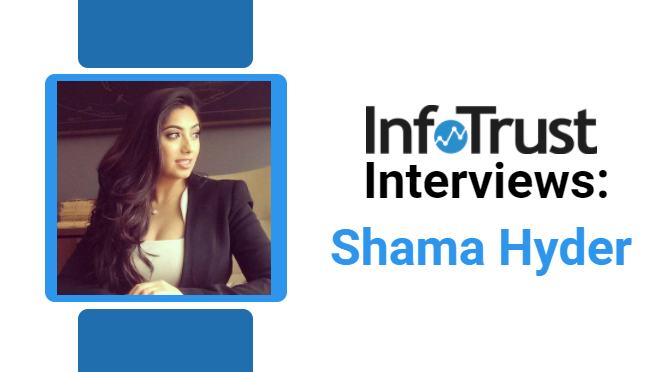
Shama Hyder is a visionary strategist for the digital age. A web and TV personality, a bestselling author, and the award-winning CEO of The Marketing Zen Group—a global online marketing and digital PR company, she has aptly been dubbed the “Zen Master of Marketing” by Entrepreneur Magazine and the “Millennial Master of the Universe” by FastCompany.com.
ML: First, lets start with an overview. So if my dates and my research is accurate, in 2008, you started the Marketing Zen Group and I’m just curious, what was the tipping point for you? What was the main reason for going this direction, starting your own company and getting on the path?
SH: Sure. The whole reason the company even started was because I felt like there was a need in the marketplace, I felt like the industry was going in a new direction, so there weren’t really resources, people, companies, knowledge or anything really to help people make sense of it. And because I started my research and work in academia, it made sense to be able to take that perspective and say “where do I go from here?”
So originally I thought that I would work a job in the field but very quickly I realized that what I considered “the field” really didn’t exist, even big companies. There was no recognition of “digital marketing” or Social Media. I saw this as an opportunity so I started my own thing, in a way, being able to blaze a trail where one didn’t exist before.
ML: So you mentioned that in the beginning, you started in academia. How did that experience help you in business?
SH: I feel like I’m always an academic at heart. I love learning and I think this field is about keeping up and constant learning. Everyday you wake up and you’re like “what changed?” “What do I need to keep up with?” What’s different?” So I think in that regard, it’s definitely been very helpful to be able to have that perspective or that framework of constantly being a student and learning and seeing what the research says. That’s been very helpful in the business world.
ML: Wonderful. So I have a set of questions that I wanted to ask around your book. If my research is accurate, your book, The Zen of Social Media Marketing, is now in its 4th edition, correct?
SH: Yeah, the 4th edition will be out this Fall and it’s available now for pre-order on Amazon.
ML: Perfect. So I guess my question is, you’ve been updating, maybe even rewriting, the book for a number of years now. What keeps changing? What do you think are some of the common themes that require your attention and have to be changed or rewritten on a regular basis vs. what continues to stay constant?
SH: The most obvious update I needed to make is all the new social media platforms that seem to arise every week. New social media platforms have different tactics and techniques that yield success, however I try and stay focused on the overall view of quality social campaigns. It’s not just about getting on board with every new platform, instead it’s more important to focus on your brand and your customers and find what works for you.
ML: So there’s 4 editions of your book and probably hundreds of other books on Social Media that are available. They might not be as good as yours, but they’re nevertheless available in the market. What do you feel people are still not getting about Social Media because there still continues to be questions: “well how should this work?” or “We are not seeing the results.” Companies, for whatever reason, are still struggling. What do you think we are not getting?
SH: There’s a couple of things. One big thing is that people see social media as a magic bullet and it’s not. People think the results are instant. So a lot of times I think people struggle with that. “Well, I sent a Tweet. Shouldn’t I get a click?”
The other thing that ties into that is consistency, it’s so important. I feel like it’s the least sexy and boring word in marketing but it is THE most important word in marketing. It’s all about doing something consistently, being in front of your audience. Our team has a meeting where we strategize about all our clients and I said to them “just because the content is old to us doesn’t mean it’s old to the audience. There’s always new audiences and where would you run the risk of over sharing these days if it’s valuable content?”
People just feel like it’s a one shot thing and it’s not. It is about experimentation. It is about consistency. It is about understanding your audience. It’s not a one-trick-pony.
ML: Understood. So the book has been obviously quite successful, best seller. What factors do you think contribute to its success? If you had to pick maybe 3 things that make this book so successful what do you think they are?
SH: I was pleasantly surprised by all the feedback. I’ll be very honest with you in terms of the things I think have contributed to its success because I think if there’s any potential authors out there listening this will be good for them.
The first thing is that there was a demand. There was an unmet demand. There’s not a book on Social Media that’s received that level of success and I say that not just because my book is so awesome, but honestly there’s more competition. Now there’s hundreds of books on Social Media. When I first wrote the book, there was 1 other book on the shelf and it was a very theoretical book. So this is a big shift in that game, if you will. So I think that definitely contributed to its initial success.
The second reason is content. I know I’m bias about saying that but I say that because it was written based on what people wanted to know, not just what I wanted to talk about. These are questions that I continue to get, so the book is really a response to the things people wanted to know and that is why, I think, it has continued to do well.
We never did a huge campaign. A lot of it was word of mouth, readers’ Tweets. I respond and I engage them. Sometimes I’m surprised by what they like to ask. I try to talk the talk as much as possible. These factors contributed to it doing well.
ML: That’s great. I’ve also noticed your new book has just released: Momentum: How to Propel Your Marketing and Propel Your Brand in the Digital Age.
SH: Yes, I’m very excited. Momentum is available now online and in every major bookseller. It’s funny because when I wrote it and it did well, immediately people were saying “when’s your next book? What are you writing about next?” and I just didn’t want to write something for the sake of writing something. The same reasons I told you book 1 did well was because I thought about ‘What do people want to know?’ and then catered to that. That’s the entrepreneur in me. I don’t want to create something where there’s no demand for it.
ML: In the description of the book, you talk a little bit about ROI and measurement. I know you alluded to, a little bit at the beginning of the interview, to qualitative and quantitative, but if we talk about the quantitative measurement, can you give our readers some suggestions or recommendations for how organizations can start thinking about, or should continue thinking about quantitative measurement of Social Media?
SH: Quantitative measurement of social media is the easier part when discussing qualitative and quantitative measurements of your ROI. Quantitative measurements are all about the hard numbers, facts, and figures, which you get by analyzing the results of your marketing campaigns. An organization should always strive to be agile at the whim of analytics. The data will tell you what’s working with your existing customer base and it’s up to you to respond to that. However, once your organization or brand continues to grow, you may find that the data starts to depict a different story, at which time you should continue being agile and respond once again.
ML: If an organization was really trying to jumpstart their Social Media results, is there a growth strategy or tactic that you have if a company was saying “how do I make a rapid change over the next 90 days?” What would you do?
SH: One good way to do this is Influencer Marketing. We do this to a lot of our clients. It’s this idea of leveraging an influencer who already has your audience. In working with them to promote your social channels. That’s definitely a good tactic for quick wins and to able to grow your Social Media following.
ML: I wanted to ask you a few more questions about your personal business habits. What marketing technologies do you recommend companies adopt? You talked about measurement, you mentioned Google Analytics, is there a technology stack that you recommend each company has?
SH: I think it really depends on the client in question and what their goals are. Always start with your goals. For example, if you don’t send a newsletter out at all right now, and you want to do marketing, there’s a lot of great platforms out there that you can use that are great for just starting out like Constant Contact, iContact, Mail Chimp. You don’t need Marketo, for example. Now, if you have a great list in order to do email marketing, now you need to segment to go to the next level then great, one of those tools makes sense.
So I’m a big believer in putting your goals first and then looking at tools that match vs. looking at tools and saying “how can we make this work for us?”
ML: What are some of your business and personal habits that contribute to your success? A number of people that I’ve interviewed say that the morning routine is very important…meditation, taking breaks during the day, writing at 5:00 in the morning is what contributes to their success. Do you have anything that is unique to you or certain habits that you think are helping you be so productive and successful?
SH: I believe in making hay when the sun shines. What I mean by that is I don’t have a morning routine. I’m not a morning person and if I forced myself to be a morning person, I would not be as productive as I am, to be honest. It’s about knowing you and what works for you. For me, if I’m trying to write an article but I can’t focus on it, I won’t spend hours trying it. I’ll just say “you know what? Right now my energy needs to go somewhere else.” And I’ll change. I don’t force myself to do things that aren’t coming naturally at the moment. Then sometimes I’ll do something else and be like “you know what? I have this great idea. I just want to sit and write.” So I’ll sit and right. It’s kind of like going with your own mental flow.
ML: So you conduct a lot of presentations and you speak so naturally on stage. Do you have any recommendations for people who are new to public speaking or those that maybe have a conference that is coming up for them and they have to do a presentation and they feel scared or not comfortable? Any recommendations for people who aspire to improve their public speaking?
SH: If you’re just starting out with speaking, and I understand it can be really daunting. I would say “practice makes perfect” there’s no way to get around that. The keynotes that I do now, I wouldn’t have been able to do them a few years ago because I just wasn’t there yet. So you have to start with the level that you feel comfortable with and find low-stake groups that you can speak at to get comfortable. Toastmasters is a great example because everyone there is helping each other. The idea is to get better at public speaking. If you’re giving a keynote and they’re paying you tens of thousands of dollars, it’s a different “stakes” game. Now all of a sudden you have to perform at a level that you’re not comfortable performing at.
You’re going to have to work up to the level that you do feel comfortable with so certainly practice and finding groups of people that you can engage with and get better with.
ML: Lastly, a number of people that I talk to that are in this digital space say it’s very important for them to unplug from Social Media. Some try to turn off their phones or to not communicate via Social Media channels. Do you have something like this?
SH: I do. I’m very picky about how I use Social Media. For example, on Instagram, I don’t follow people back. I have 2 friends that only Instagram so I follow them, but other than that, you’ll see it on my Instagram, I don’t use it to keep up with people. My Instagram is kind of my personal diary and if someone wants to follow, it’s open and they can, but that’s not how I use the tool. That’s giving yourself permission. People will say “oh, she doesn’t follow people back on Instagram.” That’s not how I use it. I understand that’s how other people use it. I’m making a choice because I have other platforms where I do follow and connect like LinkedIn, Twitter, Facebook, but I choose to Instagram differently and that’s OK.
I do unplug at times, from Social Media overall, where I feel like I need a break…kind of a reset. I think there’s a lot to be said about mindfulness in technology and that hasn’t come to the forefront yet, but it will.
ML: What do you see as next for you? Obviously, your new book is coming out. Can you give us a preview of other exciting ventures that you are working on or planning to work on?
SH: There’s so much going on. The book is obviously the big thing right now. We’re very excited about it. The whole team and I have gotten such great and positive feedback right now that I hope people will check it out. That’s my big push right now. There’s also lots of great content that we’re creating on Shama TV…videos and so forth. That’s a big thing for us. Actually our team just won a Hermes Award for educational programming, a Gold Award for 2016. Check out Shama TV and the book. The goal is to create really good content.
Resources:
You can learn more about Shama on her website
Connect with her on Twitter and Linkedin
To learn more about Marketing Zen


